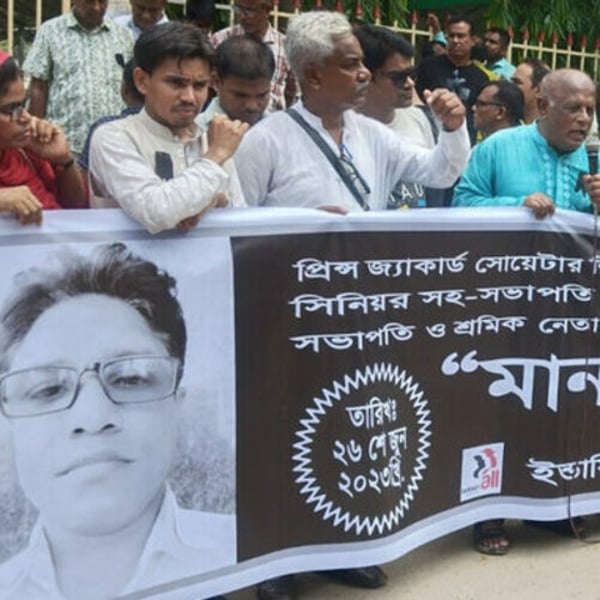Translated by
Nicola Mira
Published
Sep 8, 2023
On September 7, representatives of two NGOs, Clean Clothes Campaign (CCC) and XR Fashion Action (XFA), interrupted the ‘Best of Bangladesh’ trade event in Amsterdam to demand justice for Shahidul Islam, a Bangladeshi union leader who was murdered in June. At the time, Islam was involved in negotiations with a local textile producer.
A union leader who had been active for 25 years in the textile industry, Shahidul Islam represented the Bangladesh Garment and Industrial Workers Federation. He was beaten to death on June 25 outside the Prince Jacquard Sweater factory, north of Dhaka, where striking workers were demanding the payment of €211,000 in wage and bonus arrears. Unable to meet the factory’s absent management, Islam had urged the demonstrators to be patient, but was attacked as he left the site.
NGOs are accusing the Bangladeshi authorities of dragging their feet in their investigation, and are also trying to sound a warning about the reality of civil rights in the country. To do so, CCC and XFA militants, brandishing portraits of Islam, took advantage of the ‘Best of Bangladesh’ trade event in Amsterdam, organised by the Bangladesh Apparel Exchange, to which no NGO or union representative had been invited.
Faruk Hassan, president of the Bangladeshi garment manufacturers and exporters association (BGMEA) asked the authorities in June to shed light on the matter, and to bring the murders and anyone involved to justice. NGOs have suggested that, underlying this whole affair, there is the local textile producers’ fear that Islam’s murder, and the authorities’ failure to solve it, will fuel wage-related unrest in the industry. At the end of 2022, with inflation mounting, widespread demonstrations took place in Bangladesh.

Salary issues in Bangladesh have an international dimension too. Improving working conditions and labour rights in the country are major issues for the Bangladeshi textile industry in its relationship with Western buyers, as BGMEA told FashionNetwork.com earlier this year. Islam’s murder occurred only a few weeks after the 10th anniversary of the Rana Plaza disaster, a tragedy that had a global impact with its 1,100 deaths, drawing the world’s attention to the working conditions in the Bangladeshi garment industry.
“The Bangladesh government is yet to act comprehensively to end continuing violations of garment workers’ rights, including anti-union tactics by managers and assaults on union organizers,” said Human Rights Watch, in a statement supported by international trade unions IndustriAll and UNI Global Union. “The United States and European Union have both linked Bangladesh’s continued access to trade preferences to making urgent improvements in labour rights and workplace safety,” added the NGO. The US government has officially condemned Islam’s murder.

The textile and garment industry is the largest export sector in Bangladesh. In 2022, the country ranked second among the EU’s apparel suppliers, exporting €21.8 billion worth of goods into Europe, a 52% increase. Bangladesh was also the third-largest apparel supplier to the USA, with exports worth €9.1 billion, a 36% increase.
Copyright © 2023 FashionNetwork.com All rights reserved.







